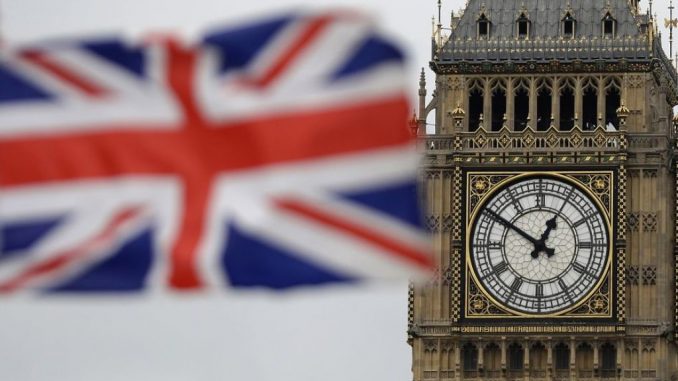Largest and most detailed study of attitudes towards Jews and Israel ever conducted in Britain finds one in three citizens holds at least one anti-Semitic attitude

LONDON — Nearly one in three Britons holds at least one anti-Semitic attitude and more than half endorse at least one hard-line anti-Israel statement, finds a major new study published today.
It also establishes an “unambiguous” link between anti-Semitism and hostility towards Israel – suggesting that the stronger the level of anti-Israel feeling, the more likely it is to be accompanied by anti-Semitic attitudes – and probes the attitudes of those who support the far-left and the far-right, as well as British Muslims.
But the report – the largest and most detailed survey of attitudes towards Jews and Israel ever conducted in Britain – also concludes that the proportion of what it terms “hardcore anti-Semites” in the population is small, while most Britons hold a favorable opinion of Jews and the vast majority do not harbor any anti-Semitic views. Moreover, it found that only 6% of Britons believe Israel has no right to exist, and less than 10% back the BDS movement.
Levels of anti-Semitism in Great Britain are among the lowest in the world
“Levels of anti-Semitism in Great Britain are among the lowest in the world. British Jews constitute a religious and ethnic group that is seen overwhelmingly positively by the absolute majority of the British population,” writes the report’s author, Dr. Daniel Staetsky, senior research fellow at the London-based Institute for Jewish Policy Research (JPR) which published the research.
Almost 70 percent of Britons hold a favorable opinion of Jews, with a further 20 percent holding no view. The figures are in line with views towards some other religious minorities, such as Hindus, and rather more positive than attitudes towards Muslims. Moreover, 80% of those surveyed agreed with the statement: “A British Jew is just as British as any other British person,” while around 60% backed the view that “British Jews make a positive contribution to British society.”
The study, conducted by both face-to-face interviews and online polling, suggests that an open dislike of Jews, combined with developed negative ideas, is confined to no more than 2.4% of British adults. A further 3% are termed “softer anti-Semites.” They endorsed fewer, but still multiple, statements that are generally perceived by Jews to be anti-Semitic.
“This relatively small group of about 5% of the general population can justifiably be described as anti-Semites,” argues the report.
Nonetheless, the study suggests that anti-Semitic attitudes are more widespread. It found that around 15% of Britons endorsed two or more of the anti-Semitic statements put to them, while a further 15% agreed with one of them.
The report strongly rejects the notion that 30% of the British population is anti-Semitic, noting that a majority of those who backed only one of the anti-Jewish statements also agreed with one or more of the positive statements about Jews.
Their way of thinking about Jews are “complex, combining both positive and negative aspects,” the study ventures. At the same time, the 30% figure “captures the current level of the diffusion of anti-Semitic ideas in British society,” writes Staetsky, who believes that a distinction should be drawn between “counting anti-Semites” and “measuring anti-Semitism.”

The report indicates that Holocaust denial is endorsed by only a small minority of Britons: 2% agreed that the Holocaust was a myth and 4% thought it had been exaggerated. These figures correspond with the number of “hardcore anti-Semites” identified by the study. However, other anti-Semitic attitudes – that Jews think they are superior to others, get rich at the expense of others, exploit the Holocaust for their own purposes and that British Jews have different interests from their fellow citizens – gain wider, albeit limited, traction. Between 10 and 13% agreed to some extent with those statements.
Dr. Jonathan Boyd, executive director of the JPR, hailed some of the “very positive” indicators in the report.
“Seventy percent of adults in Great Britain, given multiple opportunities to even mildly agree with an anti-Jewish view, do not do so,” he suggested. “And much of the remainder would likely recoil at any suggestion that they are anti-Semitic, and be highly apologetic if challenged by someone who took offense,” says Boyd.

But the study had less good news for supporters of Israel in the UK. It finds that 12% of Britons hold “hard-core” anti-Israel attitudes and a further 21% have what it calls “softer negativity towards Israel.” Fifty-six percent of those questioned backed at least one anti-Israel statement, although the report emphasized that it would be wrong to suggest that that level of Britons were anti-Israel.
Arguing that “the data on anti-Israel attitudes is less good,” Boyd expressed particular concern that close to a quarter of Britons believe, to some extent at least, that Israel is deliberately trying to wipe out the Palestinian population, and about one in five believe – again to some extent at least – that Israel is an apartheid state.
“These types of prejudices clearly have some currency in British society, and more needs to be done, both in Britain and Israel, to demonstrate their falsehood,” he argued. He noted that there are “often equal or greater levels of disagreement with these types of notions, and that much of British society is completely neutral on them.”
Jennifer Gerber, director of Labour Friends of Israel, termed the prevalence of anti-Israel attitudes among some sections of the British public “disturbing.”
“It should act as a wake-up call for politicians and the media to avoid at all times language and actions which breed those attitudes and give comfort to those who seek to demonize and delegitimize the State of Israel,” Gerber suggested.

The report also measures attitudes towards Israel against those of some other states. While 40-50% of Britons expressed a favorable view towards Germany and the United States, only 17% held a similarly positive view towards Israel. One-third held a negative view and 40% said their opinion was neither favorable nor unfavorable.
The report suggests that Israel’s ratings fall in between those of Germany and the US, on the one hand, and Russia, Syria and Iran, on the other. Around 10% of Britons were favorable to each of the countries in the latter group, whereas each register close to or above 50% unfavorability.
The study sought, for the first time in Britain, to test the relationship between anti-Semitism and anti-Israel attitudes. It argues that while the latter are generally not anti-Semitic, there was a link.
“A majority of those who hold anti-Israel attitudes do not espouse any anti-Semitic attitudes, but a significant minority of those who hold anti-Israel attitudes hold them alongside anti-Semitic attitudes,” it suggests.

Thus while 86% of those who do not hold any anti-Israel attitudes do not have anti-Semitic attitudes, among those holding a large number of anti-Israel attitudes that figure falls to 26%. The study’s finding that nearly half of those with strong anti-Israel attitudes believe that “Jews exploit Holocaust victimhood for their own purposes” – a view held by only one in 10 Britons as a whole – represents “a very significant insight into the mindset of the segment of the population espousing strong anti-Israel attitudes,” argues Staetsky.
“It goes a long way towards explaining the degree of apprehension towards this segment felt in the Jewish community,” he continues.
Dave Rich, deputy director of communications at the Community Security Trust, which supported the study, underlines the importance of the results.
“The finding that people who are strongly anti-Israel are also more likely to be anti-Semitic might seem obvious to some, but this is the first time it has been statistically proven,” says Rich.
“This is important, because many of these strongly anti-Israel people, most of whom hold at least one anti-Semitic viewpoint, are likely to be activists in anti-Israel movements who go on demonstrations, run their stalls and argue their case on social media. Those groups ought to take this research seriously if they are genuinely opposed to anti-Semitism as they claim,” Rich says.

Following two years in which the opposition Labour party has faced sustained criticism for its perceived failure to tackle allegations of anti-Semitism within its ranks, the study also explores attitudes towards Jews and Israel on the left. Under its far-left leader, Jeremy Corbyn, Labour polled 40% in May’s general election, while winning the backing of only 13% of Jews.
Despite the heightened tensions between the community and Corbyn’s supporters, the research indicates that levels of anti-Semitism on the left – including among those who identify as “very left-wing” – are no different from the population more generally. Instead, the most anti-Semitic group is to be found on the far-right, where anti-Jewish attitudes are two to four times higher than among Britons as a whole.
Nonetheless, the fact that – given its strong anti-racist ideals – anti-Semitism does not register levels lower than the average among those on the left is, perhaps, surprising.
Moreover, Staetsky also finds that anti-Israel attitudes are more prevalent across all sections of the left – including those who identify themselves as only “slightly to the left of center” – than among the general population.

Nearly 80% of those on the far-left backed at least one anti-Israel statement (as against 56% of all Britons), with 23% backing six to nine (in contrast to 9% more generally).
As Rich, whose book, “The Left’s Jewish Problem: Jeremy Corbyn, Israel and Anti-Semitism,” was published last year, argued: “This report shows that there is no more anti-Semitism on the left than elsewhere, but crucially there is no less anti-Semitism either. So when people complain that they have heard anti-Semitic comments from people on the left or in the Labour party, it isn’t part of a Blairite plot against Corbyn or a Zionist trick to silence critics of Israel – they are telling the truth and their complaints should be taken seriously.”
Anti-Semitism and anti-Israel attitudes are two to four times higher among Muslims
The report also examines attitudes among key religious groups. While it concludes that anti-Semitism and anti-Israel attitudes are no different among Christians than the wider population, it found such attitudes were two to four times higher among Muslims. Non-religious Muslims were less likely to back anti-Semitic or anti-Israel attitudes, while those who demonstrated Islamist views were more likely to.
However, the report also indicated that “significant proportions of Muslims reject all such prejudice,” with a majority neutral or disagreeing with each of the anti-Semitic statements put to them. Staetsky also notes the relatively small size of both Britain’s Muslim population and those who hold far-left or far-right attitudes.
The research is published as recent polling suggests that nearly half of British Jews perceive anti-Semitism to be a problem in the UK, with two-thirds believing it to be on the increase. By distinguishing between the small number of anti-Semites and rather more widespread presence of anti-Semitic attitudes, the report throws new light on the seeming disparity between the low levels of anti-Semitism in Britain and the anxieties of Jews in the country.
“Most Jews do not come into regular contact with strongly anti-Semitic individuals,” it argues. “Such people are few in number to start with… However, what Jews are exposed to far more frequently are people who are not strongly anti-Semitic, yet who hold, and from time to time may vocalize, views that may make them feel uncomfortable or offended.”
But how likely are Jews in Britain to encounter something potentially more dangerous?
Asked about the use of violence against certain groups or institutions in defense of their political or religious beliefs and values, 4% of Britons suggested it could be “often or sometimes” justified against Jews – a similar figure that was registered for Israelis and Zionists. These numbers were lower than for any of the others groups – which ranged from EU institutions to banks and big business, Muslims and immigrants – which were investigated.
Indeed, more Britons thought violence might be justified against British military personnel than they did against Jews. Moreover, those who showed the greatest willingness to tolerate violence against Jews also appeared most ready to justify violence against other groups, including the armed forces, suggesting less “a coherent ideological worldview” than a willingness to regard violence as an “acceptable method of protest in general.”





A comparable number of Britons very likely hates the EU, the US China, Russia etc… and perhaps themselves TOO.